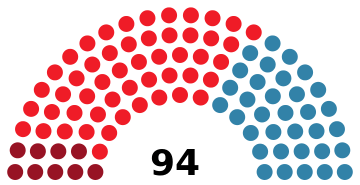Madrilenian parliamentary election, 1983

|
|
|
|
All 94 seats in the Assembly of Madrid
48 seats needed for a majority |
| Registered |
3,381,610 |
| Turnout |
2,357,425 (69.7%) |
| |
First party |
Second party |
Third party |
| |
.jpg) |
 |
 |
| Leader |
Joaquín Leguina |
Luis Guillermo Perinat |
Lorenzo Hernández |
| Party |
PSM-PSOE |
CP |
PCE |
| Leader since |
14 December 1979 |
25 January 1983 |
1983 |
| Seats won |
51 |
34 |
9 |
| Popular vote |
1,181,277 |
798,853 |
207,058 |
| Percentage |
50.5% |
34.1% |
8.8% |
|
|
The 1983 Madrilenian parliamentary election was held on Sunday, 8 May 1983, to elect the 1st Assembly of Madrid, the regional legislature of the Spanish autonomous community of Madrid. At stake were all 94 seats in the Assembly, determining the President of the Community of Madrid.
The election was won by the Spanish Socialist Workers' Party (PSOE), who won an absolute majority of seats and votes, the only occasion on which the party has achieved this in a Madrid Assembly election.[1] In total the PSOE won 51 seats.
The People's Coalition, an electoral alliance led by the People's Alliance (AP), which also included the People's Democratic Party (PDP) and the Liberal Union (UL), emerged as the second largest grouping in the Assembly.
The Communist Party of Spain was the only other party to win seats in the Assembly. In 1986, the party joined with other left-wing movements to form the current United Left.
Electoral system
The number of seats in the regional Assembly was determined by the population count, with 1 seat per each 50,000 inhabitants or fraction greater than 25,000, according to the most updated census data.[2] As the updated population census for the 1983 election was the corresponding to year 1982 (4,686,695), the Assembly size was set to 94 seats.[3]
All Assembly members were elected in a single multi-member district, consisting of the Community's territory (the province of Madrid), using the D'Hondt method and a closed-list proportional representation system. Voting was on the basis of universal suffrage in a secret ballot. Only lists polling above 5% of valid votes in all of the community (which include blank ballots—for none of the above) were entitled to enter the seat distribution.[4]
Opinion polls
Seat projections
Opinion polls showing seat projections are displayed in the table below. The highest seat figures in each polling survey have their background shaded in the leading party's colour. In the instance that there is a tie, then no figure is shaded. 48 seats were required for an absolute majority in the Assembly of Madrid.
Results
Summary of the 8 May 1983 Madrid Assembly election results →
| |
| Party |
Vote |
Seats |
| Votes |
% |
±pp |
Won |
+/− |
|
Spanish Socialist Workers' Party (PSOE) |
1,181,277 | 50.47 | − |
51 | − |
|
People's Coalition (AP-PDP-UL) |
798,853 | 34.13 | − |
34 | − |
|
Communist Party of Spain (PCE) |
207,058 | 8.85 | − |
9 | − |
| |
|
Democratic and Social Centre (CDS) |
73,124 | 3.12 | − |
0 | − |
|
Liberal Democratic Party (PDL) |
43,309 | 1.85 | − |
0 | − |
|
Independent Electors' Action (ADEI) |
10,327 | 0.44 | − |
0 | − |
|
Communist League-Workers' Agreement (LC-AO) |
6,301 | 0.27 | − |
0 | − |
|
Spanish Communist Workers' Party (PCOE) |
4,473 | 0.19 | − |
0 | − |
|
People's Fight Coalition (CLP) |
2,168 | 0.09 | − |
0 | − |
|
Blank ballots |
13,735 | 0.59 | − |
|
| |
| Total |
2,340,625 | 100.00 | |
94 | − |
| |
| Valid votes |
2,340,625 | 99.29 | − |
|
| Invalid votes |
16,800 | 0.71 | − |
| Votes cast / turnout |
2,357,425 | 69.71 | − |
| Abstentions |
1,024,185 | 30.29 | − |
| Registered voters |
3,381,610 | |
| |
| Source(s):
|
| Vote share |
|---|
|
|
|
|
|
| PSOE |
|
50.47% |
| AP-PDP-UL |
|
34.13% |
| PCE |
|
8.85% |
| CDS |
|
3.12% |
| PDL |
|
1.85% |
| Others |
|
0.99% |
| Blank ballots |
|
0.59% |
| Parliamentary seats |
|---|
|
|
|
|
|
| PSOE |
|
54.26% |
| AP-PDP-UL |
|
36.17% |
| PCE |
|
9.57% |
References

.jpg)
